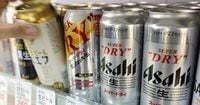Japanese beverage titan Asahi Group has been thrust into the spotlight this week after a sweeping cyberattack crippled its domestic operations, throwing the nation’s supply of beer and bottled drinks into chaos. The incident, which began on Monday, has left restaurants, bars, retailers, and even convenience stores scrambling to find alternatives as shelves run bare of the company's iconic products, including its best-selling Super Dry beer and bottled teas. As the disruption enters its sixth day with no clear end in sight, consumers and businesses alike are feeling the pinch, and the broader implications for Japan's supply chain resilience are coming into sharp focus.
According to Reuters, the attack forced Asahi to halt all order processing, shipments, and call-center functions across Japan. The company quickly confirmed that the incident was a ransomware attack, stating on October 3 that its servers had been “targeted by a ransomware attack,” though it declined to disclose specific details in an effort to “prevent further damage.” The company’s CEO, Atsushi Katsuki, sought to reassure stakeholders, saying, “We are making every effort to restore the system as quickly as possible, while implementing alternative measures to ensure continued product supply to our customers.”
Despite these assurances, the impact has been immediate and widespread. Asahi’s nationwide ordering and distribution systems were paralyzed, leading to a severe shortage of its products. The company’s largest domestic plants have been at a standstill since the attack, and most of its order-taking and shipping operations remain halted. The digital offensive has not only affected Asahi’s own product lines but has also disrupted products consigned to the company, raising fears of stock shortages among retailers across the country.
In an effort to keep some product moving, Asahi resorted to old-school methods. By Wednesday, employees were dispatched to visit customers in person and take handwritten orders for certain food and soft-drink lines. Japan’s TBS News even reported that the company had reverted to using paper and fax machines to process orders—a stark contrast to its usual high-tech operations. Alcoholic beverage orders, however, were suspended to prioritize deliveries already in the pipeline. On Friday, the company managed to restart shipments for the first batch of manually processed orders, but supplies remained tight and the backlog daunting.
The effects have rippled through the Japanese retail landscape. Convenience store giants such as Lawson, FamilyMart, and 7-Eleven have all warned customers that stocks of Asahi beer and other goods would soon run short. FamilyMart, whose own-label bottled teas are supplied by Asahi, told the BBC that these could be out of stock “with no prospect of resumption,” and apologized to customers for the inconvenience. Seven-Eleven Japan posted notices in stores warning of possible shortages of popular Asahi products, while Lawson announced plans to prepare alternative products to minimize the impact.
Restaurants and bars, too, are feeling the squeeze. At Kushiyaki Tosaka, a Tokyo yakitori outlet that typically serves only Asahi-branded beer, chef Tomiko Yano lamented the situation: “It’s a bit of a problem. We specialize in skewered chicken and it pairs really well with Super Dry. A lot of customers say that, so I am a little worried about the shortage.” The restaurant had to switch to rival Sapporo beer after running out of its last keg of Super Dry. This shift, while pragmatic, underscores just how integral Asahi products are to the dining experience in Japan.
The disruption has rattled investors as well. Asahi’s shares have fallen about 4% since the attack, reaching their lowest level since February. The company, which posted around 3 trillion yen (approximately $20 billion) in consolidated sales for the year through December 2024, is now investigating the potential impact on its earnings. While Asahi has confirmed that the attack is limited to its Japanese operations, with no confirmed leak of customer data as of this week, it has also acknowledged signs of possible information leakage and is working with authorities to investigate the incident further.
Chief Cabinet Secretary Yoshimasa Hayashi addressed the issue in a rare comment on a private firm’s crisis, stating, “The relevant ministries and agencies are cooperating to gather information.” Supermarkets near Tokyo have suspended online orders of Asahi’s goods until the company provides a clear outlook for recovery, and some stores have expressed concern that Asahi products “will not hit the shelves” from Sunday onward.
The cyberattack on Asahi is part of a growing trend of ransomware and digital assaults targeting major companies around the world. Recent victims include Britain’s Jaguar Land Rover, which was forced to shut down its factories for almost a month, and retailers like Marks & Spencer and the Co-op Group. In Japan, other large firms such as publisher Kadokawa Corp. have also been hit by similar attacks in recent months, highlighting the vulnerability of even the most established brands to sophisticated cyber threats.
Asahi’s European operations, which include brands such as Fuller’s in the UK, Peroni, Pilsner Urquell, and Grolsch, have not been affected by the attack. Japan, however, accounts for about half of Asahi’s global sales, making the domestic disruption particularly painful for the company and its stakeholders.
The company’s response has been swift but necessarily old-fashioned, as digital systems remain offline. Asahi has begun partial manual order processing and shipment, but the company admits it is “unable to receive email communications from external sources.” Events have been cancelled and product launches delayed as the company works with outside specialists to restore its computer systems. There is, as yet, no timeline for a full recovery.
The attack has reignited debate about the resilience of Japan’s supply chains and the preparedness of its corporate giants to fend off cyber threats. For many Japanese consumers, the most immediate concern is simple: when will their favorite beer and bottled tea return to store shelves?
Asahi, founded in 1949 and renowned for its Super Dry rice lager, Mitsuya Cider, Calpis, and a wide range of beverages and food products, now faces a critical test of its crisis management and technological infrastructure. For now, the company and its customers must weather the storm, hoping that the taps—and the delivery trucks—will soon flow freely once again.





